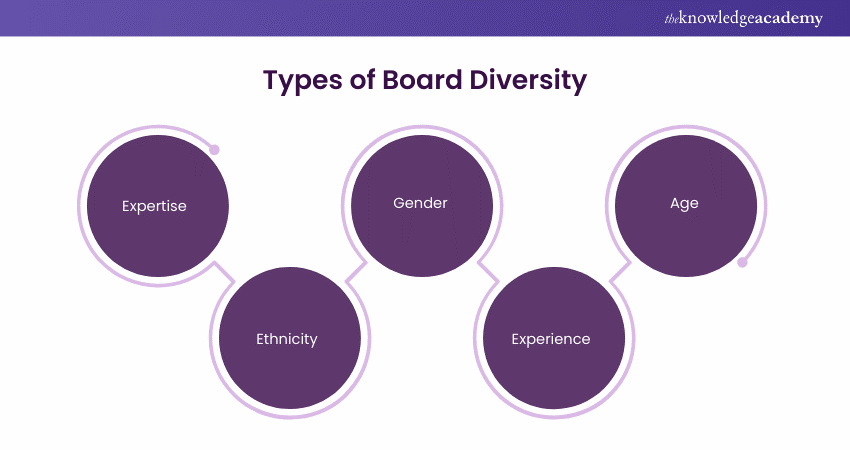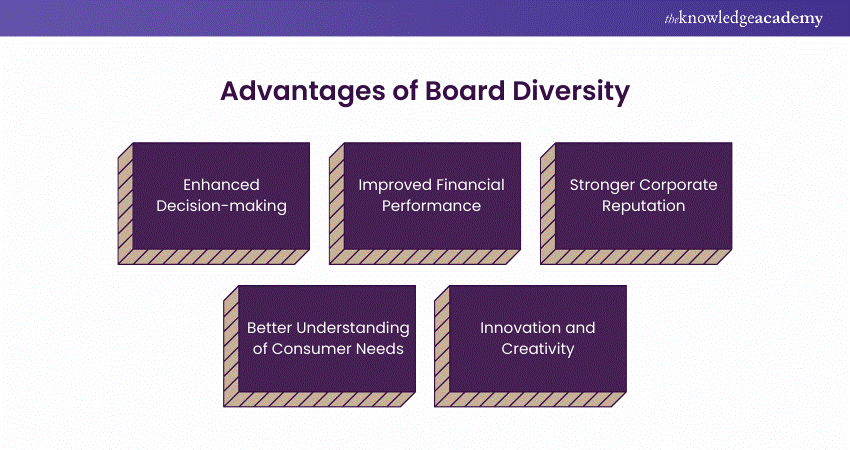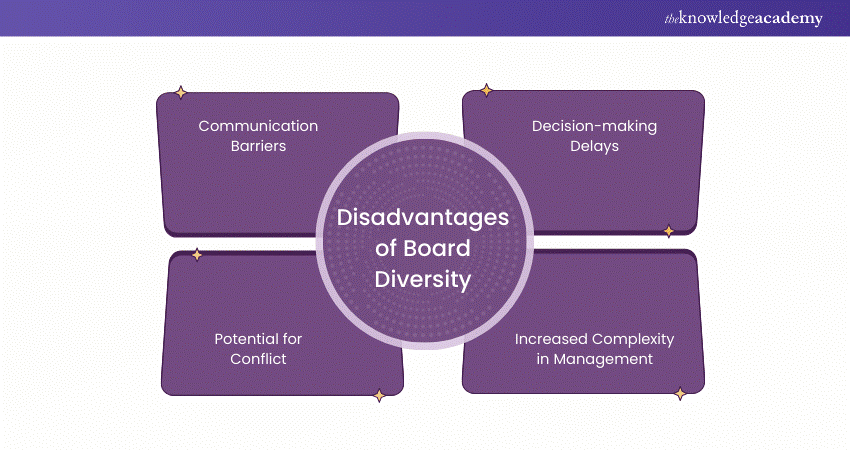We may not have the course you’re looking for. If you enquire or give us a call on +44 1344 203 999 and speak to our training experts, we may still be able to help with your training requirements.
We ensure quality, budget-alignment, and timely delivery by our expert instructors.

Imagine stepping into a boardroom where every decision is shaped by voices from different backgrounds, experiences, and perspectives—a board that truly mirrors the diversity of the world outside its walls. In this interconnected world, companies are recognising that Board Diversity isn’t just a trendy buzzword; it’s a game-changer that brings a competitive edge, fosters innovation, and builds trust with customers and employees alike.
But what does Board Diversity really mean, and why does it matter so much? True diversity goes beyond checking boxes; it’s about creating a vibrant mix of perspectives that see the world through unique lenses. In this blog, we’ll delve into the meaning of diversity in an organisation, the types that make a difference, and examples of companies leading the way.
Table of Contents
1) What is Board Diversity?
2) Types of Board Diversity
3) Implementing Board Diversity
4) Examples of Board Diversity
5) Advantages of Board Diversity
6) Disadvantages of Board Diversity
7) Conclusion
What is Board Diversity?
Board Diversity is a term that refers to the inclusion of a range of individuals from various backgrounds, skills, and perspectives in the leadership of an organisation. Essentially, it is the practice of ensuring that a company’s board of directors is made up of individuals who bring diverse qualities, such as expertise, gender, age, ethnicity, and professional experiences. Rather than a superficial approach, Board Diversity is about creating a balanced and dynamic group that can tackle challenges from different angles.
The Importance of Board Diversity
The importance of Board Diversity is increasingly recognised in today’s business landscape.
1) Better Financial Performance: Diverse boards of companies generally bring better financial performance due to varied opinions and balanced decision-making.
2) Innovation: The diversified board leads to innovation and creativity as various viewpoints introduce new ideas and solutions.
3) Better Understanding of the Customers: Companies with diverse boards have a better idea about diverse customers, and policies are shaped to meet the requirements of diverse customers.
4) Reputation Enhancement: Stakeholders, employees, and customers appreciate diversity, and this will enhance the company's brand and credibility.
5) Social Responsibility: The representation of society’s diversity reflects commitment to social responsibility and inclusiveness.
6) Effective Decision-Making: Diversity positively influences decision-making; diverse boards will be in a better position to make rounded decisions by considering a variety of insights in strategic planning.
Types of Board Diversity
When considering Board Diversity, there are multiple types to focus on, each contributing a unique value to the organisation. Let’s dive into the key types of Board Diversity that companies are prioritising today.

1) Expertise
Bringing diverse areas of expertise to the table is crucial for a well-rounded board. Board members with different skill sets can offer insights into various aspects of business operations, from finance and technology to marketing and law.
A tech start-up, for instance, might benefit from a board member with expertise in cybersecurity, while a retail company could gain insights from someone with a background in consumer psychology. Expertise and diversity are essential for addressing the wide-ranging challenges that companies face.
2) Ethnicity
Ethnic diversity on boards promotes inclusivity and reflects a company’s commitment to representing people from different cultural backgrounds. When board members come from various ethnic backgrounds, they bring a range of perspectives shaped by their unique cultural experiences.
Ethnicity can drive innovation and cater to a more diverse customer base. Ethnic diversity also signals to both employees and customers that the company values and supports a multicultural environment.
3) Gender
Gender diversity is one of the most visible and widely discussed aspects of Board Diversity. Studies consistently show that gender-diverse boards are more effective, as they tend to make decisions with greater consideration and are more open to new perspectives.
Women on boards bring their experiences and perspectives, which can be especially valuable in traditionally male-dominated industries. Gender diversity fosters a more balanced decision-making process and promotes a culture of equality within the organisation.
4) Experience
Board Diversity also encompasses different career experiences. A board with a mix of industry veterans, individuals from non-traditional backgrounds, and professionals with cross-industry experience is more likely to offer fresh ideas and challenge established norms.
Individuals with experience in start-ups, non-profits, or government roles bring a unique mindset, allowing the board to explore opportunities from a variety of angles and adopt different approaches to problem-solving.
5) Age
Age diversity introduces generational differences, which can be invaluable in understanding the needs of various age groups within a company’s customer base. While experienced, older board members bring a wealth of industry knowledge and a historical perspective; younger members may be more in touch with emerging technologies and trends.
A multigenerational board fosters a balance of innovation and experience, which is essential for navigating the rapid changes in today’s business world.
Unlock your leadership potential! Sign up for our Directors Development Training and lead your organisation to new heights – join now!
Implementing Board Diversity
Implementing Board Diversity is essential for fostering innovation and balanced decision-making within an organisation. Here's how you can implement Board Diversity:
1) Strategic Planning and Commitment: Diversity in a board requires strategic planning and commitment toward diversity.
2) Identify Gaps: Assess the current board composition and figure out what is missing or lacking in diversity.
3) Engage Diverse Recruitment Agencies: Partner with specialised diversity agencies to recruit candidates from different backgrounds and with different levels of expertise.
4) Set Diversity Goals: Defining clear, measurable goals aimed at Board Diversity.
5) Ensure Transparency and Accountability: Track the developments and report progress to stakeholders to maintain transparency.
6) Foster Openness to New Perspectives: Foster a board culture that is open to new ideas and diverging viewpoints because these serve as an essential in getting a real diverse board.
Examples of Board Diversity

There are numerous examples of organisations that have successfully implemented diverse boards. Global companies like Coca-Cola, Unilever, and Johnson & Johnson are known for their commitment to Board Diversity. Coca-Cola, for instance, has board members from different ethnicities, genders, and backgrounds, which contributes to its inclusive and innovative corporate culture.
In the technology sector, Salesforce has a strong commitment to gender and ethnic diversity, with a board that includes professionals from a range of backgrounds. These examples demonstrate that diversity is not limited to any one industry; instead, it is an asset across all sectors.
Advantages of Board Diversity
A diverse board offers several advantages that contribute to a company’s success. Here are some of the most compelling benefits:

1) Enhanced Decision-making: Diverse boards bring multiple perspectives, which lead to more thorough discussions and well-rounded decisions. Different viewpoints help the board foresee risks and opportunities that a homogeneous group might overlook.
2) Improved Financial Performance: A few research indicates that companies with Board Diversity tend to outperform those without diversity. Diverse boards are more likely to tap into innovative ideas and adapt to changes, which positively impacts the bottom line.
3) Stronger Corporate Reputation: Companies with diverse boards are viewed as progressive and socially responsible. This can strengthen brand loyalty, attract top talent, and appeal to investors who prioritise environmental, social, and governance (ESG) factors.
4) Better Understanding of Consumer Needs: A board that reflects the diversity of its customer base is better positioned to understand their needs and preferences. This can be particularly valuable in industries like retail, where consumer preferences vary widely.
5) Innovation and Creativity: Diversity encourages a culture of openness, where new and unconventional ideas are more likely to be explored. This leads to innovative solutions and can give the company a competitive edge.
Disadvantages of Board Diversity
While Board Diversity has numerous benefits, there are some challenges and potential downsides to consider:

1) Communication Barriers: With diversity in backgrounds and perspectives, there can be differences in communication styles. This sometimes leads to misunderstandings or delays in decision-making as the board members work to find common ground.
2) Decision-making Delays: A diverse board may experience longer decision-making processes due to differing opinions and viewpoints. While these discussions are often beneficial, they can slow down the process, which might be challenging in industries that require quick decision-making.
3) Potential for Conflict: When individuals with diverse perspectives come together, there is always a risk of conflict. Different viewpoints can lead to disagreements, and if not managed well, these conflicts can hinder the board’s effectiveness.
4) Increased Complexity in Management: Managing a diverse board requires a higher level of coordination and sensitivity to various needs and preferences. For companies unprepared for these challenges, diversity can initially seem overwhelming.
Empower your career! Register for our Introduction to Management Course and learn to lead with confidence and impact – Join today!
Conclusion
Board Diversity is more than just a trend; it’s an essential aspect of modern governance that brings significant value to organisations. A diverse board fosters innovation, enhances decision-making, and reflects the values of inclusivity that today’s consumers and stakeholders appreciate. Embracing diversity at the board level is a strategic decision that positions a company for long-term success in a diverse and evolving world.
Ready to lead with confidence? Join our Personal and Organisational Development Course and take the first step to success – Register now!
Frequently Asked Questions

A firm would think about measuring Board Diversity by assessing composition concerning attributes like gender, ethnicity, age, professional expertise, and experience. Companies can also track their diversity goals and assess whether the board corresponds with the workforce and customer demographics.

Board Diversity rule is the requirement, or directive forces that companies bring under-represented groups, either females or minorities, to the boards. These rules vary by region, with some mandates enforcing quotas for diversity.

The Knowledge Academy takes global learning to new heights, offering over 30,000 online courses across 490+ locations in 220 countries. This expansive reach ensures accessibility and convenience for learners worldwide.
Alongside our diverse Online Course Catalogue, encompassing 19 major categories, we go the extra mile by providing a plethora of free educational Online Resources like News updates, Blogs, videos, webinars, and interview questions. Tailoring learning experiences further, professionals can maximise value with customisable Course Bundles of TKA.

The Knowledge Academy’s Knowledge Pass, a prepaid voucher, adds another layer of flexibility, allowing course bookings over a 12-month period. Join us on a journey where education knows no bounds.

The Knowledge Academy offers various Management Courses, including the Directors Development Training, Management Training for New Managers and the Introduction to Managing People Course. These courses cater to different skill levels, providing comprehensive insights into How to Become a Board Member.
Our Business Skills Blogs cover a range of topics related to Management, offering valuable resources, best practices, and industry insights. Whether you are a beginner or looking to advance your Management Skills, The Knowledge Academy's diverse courses and informative blogs have got you covered.
Upcoming Business Skills Resources Batches & Dates
Date
 Directors Development Training Course
Directors Development Training Course
Thu 16th Jan 2025
Thu 13th Mar 2025
Thu 15th May 2025
Thu 10th Jul 2025
Thu 11th Sep 2025
Thu 13th Nov 2025







 Top Rated Course
Top Rated Course



 If you wish to make any changes to your course, please
If you wish to make any changes to your course, please


